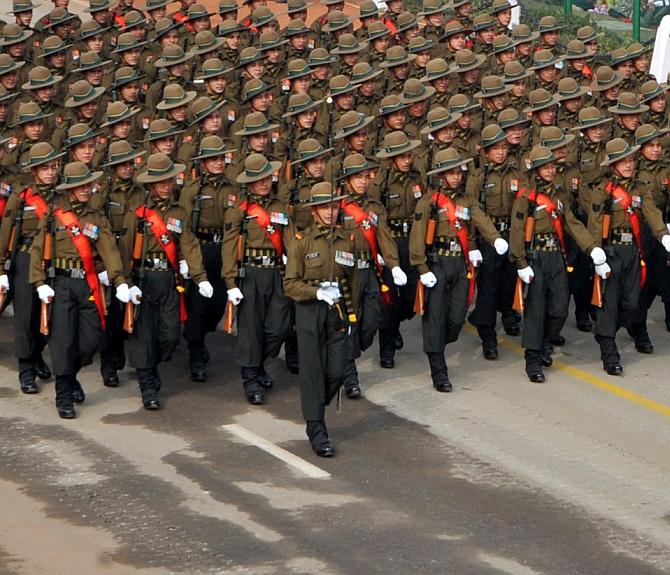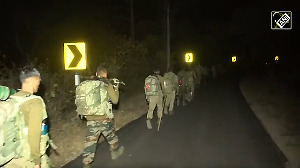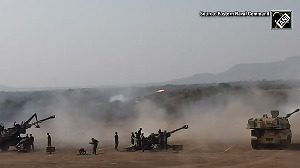'Gorkhas are terrific soldiers. They are known the world over for their fighting qualities.'

"In the Kargil War in Darjeeling district alone, 27 bodies of soldiers came back wrapped in the tricolour. The people did not know whether to mourn the dead or celebrate their sacrifice. Need I say more?" Lieutenant General Shakti Gurung (retired), former commander 4 Corps responsible for the Line of Actual Control in Arunachal Pradesh and military secretary, Army HQ, tells Rediff.com's Archana Masih in the concluding segment of a three-part interview.
General Gurung was commissioned into the Grenadiers regiment and served nearly four decades in the Indian Army. He also served as defence attache to Myanmar.
- Part 1 of the Interview: 'Assam Rifles is an excellent time tested force'
- Part 2 of the Interview: 'Oil is another reason for clashes in Manipur'
There has been no recruitment of soldiers from Nepal into the Indian Army for nearly two years -- how is this going to impact the Gorkha regiment? [General Gurung was the first Gorkha lieutenant general in the army.]
It will not. 6/1 GR was raised some five years back comprising exclusively of Indian Gorkhas.
The battalion has been performing exceptionally well in all aspects -- both professional and sports.
The Indian Army is planning to recruit tribals with similar traits from Uttarakhand, Sikkim, Himachal Pradesh to cover up for the depleting strength of the Gorkhas. What are your thoughts?
Can it make up for the loss of the value and attributes of Gorkha soldiers?
This needs adequate thought besides motivation. If you see the commissioning/recruitment standards for entry into the officers stream, a Gorkha has to be 152 cms or more in height, whereas for soldier entry the minimum height is 157 cms.
Since both are from the same stock, why should there be a difference?
When Nepalese Gorkhas were recruited their share in the Gorkha Rifles regiments was 60:40 -- the former for Nepalese and latter for Indian Gorkhas.
Now 100 per cent vacancies will be available for Indian Gorkhas which means an additional 4,000 to 5,000 vacancies each year.
Their loss is perhaps our gain, only time will tell.
Gorkhas are terrific soldiers. They are known the world over for their fighting qualities. Why would the British want them in their Army otherwise?
The manner in which the Gorkha army from Nepal overran Sikkim, Kumaon, Garhwal and the erstwhile Punjab Hills (present day Himachal Pradesh) had impressed the British.
The Gorkha empire at that time spread from the Teesta in the east to Satluj in the west -- a total of 17,000 square miles.
In the Battle of Nalapani 1814, which was the first encounter between the Gorkhas and the British East India Company, the myth of British invincibility was broken.
This is what led them to construct the Khalanga Memorial the first of its kind anywhere in the world built by a victor for its valiant adversary. This memorial is a testimony to the valour of the Gorkhas.
The Indian Gorkhas are now seeking other avenues, other professions. The youth have learned to swim the tide. Most of the people I know want their sons either to be an officer or choose a different profession.
It's a new awakening, something you cannot deny a community.
Finally, the Agnipath scheme may not be suitable to all. Nepal is no exception. Even for the Indian Army we still do not know how it will pan out as the first batch has just about finished their recruitment training.

What has been the lasting contribution of Gorkha soldiers to the Indian Army?
In the Kargil War in Darjeeling district alone 27 bodies of soldiers came back wrapped in the tricolour. The people did not know whether to mourn the dead or celebrate their sacrifice. Need I say more?
What haven't the Gorkhas done for the Indian Army? Apart from displaying exemplary soldierly qualities on the battlefield, they have also excelled in sports -- Jeetu Rai is our ace marksman, Padam Bahadur Mall was the first boxer to win a gold medal in an individual capacity at an international event, the Asian Games, Jakarta 1962, and many more.
Sunil Chhetri is the present Indian football captain, and Bharat Chhetri was the Indian hockey captain some time back.
Feature Presentation: Aslam Hunani/Rediff.com










 © 2025
© 2025